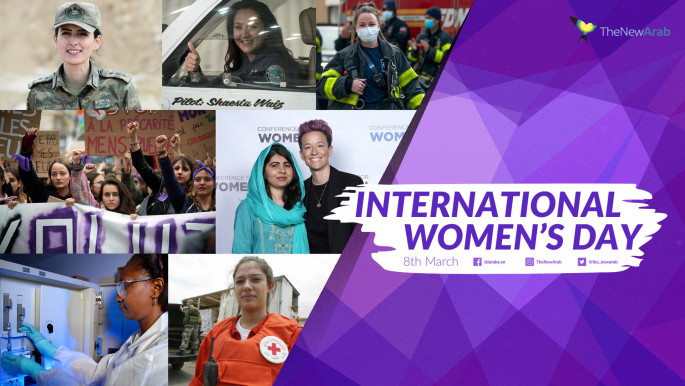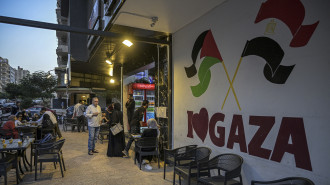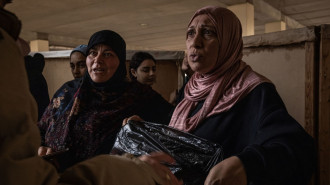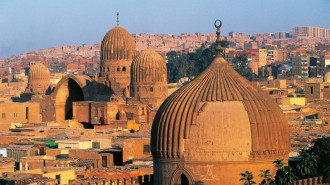In post-2003 Iraq, a climate of fear pervades daily life for women
Promises of enhanced representation and empowerment by the Bush administration have fallen flat two decades after they were made.
US-designed political structures emerged on the proviso that the day occupying boots landed, was the day injustice against women would end. Iraqi women never saw that day. The occupation fanned the flames of outmoded ideas and hierarchies.
Post-Saddam Iraq has witnessed a steep decline in living standards and education, and rife security challenges - all of which have aggravated pre-existing inequalities and hardships for women.
In statistics published in 2019, the Ministry of Women's Affairs reported that three million women have been widowed (7.5 percent of the total population) as a direct result of armed conflict, organised crime and identity-based killings.
Iraq's capital, Baghdad, is said to be home to 300,000 alone. In the absence of reliable statistics, it should be noted, as female activists contend, that real numbers are far higher.
 |
Legislation in Iraq is another get out of jail free card for religious actors and men |  |
Constitutional law reserves a meagre place for women, granted only 26 percent of seats in parliament. In preference of Islamist female candidates whose ideas are indistinguishable from the ruling class of men, women have learned to distrust a political system which reproduces patterns of discrimination and gender devaluation.
This formula, widely condemned by civil society activists, emboldens religious and tribal actors to regulate family affairs according to their own whims and personal interpretations of religious laws.
Twitter Post
|
"Legislation in Iraq is another get out of jail free card for religious actors and men," Iraqi journalist from Baghdad, Sanar Hasan, told The New Arab, describing a climate of institutionalised discrimination.
"Years of sectarian strife have turned women into political tools that sectarian actors exploit for political ends," the 26-year-old added.
"Armed Islamist groups have placed women at the top of their hit list. Without legal protections, women are still hunted down and killed."
In a series of voice notes, Hasan described a causal link between these challenges and lower levels of female well-being.
"Gender based violence, 'honour killings,' and female suicide have risen steadily. Victims are as young as 7 and 13 years old," Hasan said.
The private, domestic, sphere, Hasan added, is equally restrictive. "When it comes to women's lives, men get to roll the dice." She noted that social stigma and the obsession with family respectability erects a barrier separating women from their dreams.
"My family didn't support my decision to pursue journalism," she said. "Against all odds, I pursued it anyway, aware of the risks in a country ruled by armed groups, where security guarantees are few and far between".
"Worse than the death threats which anonymous accounts wrote to me with in reaction to pieces where I exposed the extortion of internally displaced women by militias, was the threat of being grounded at home by my family if they found out I was practicing journalism."
"I braved that risk" she said, "and snuck out of the house without my family's consent or knowledge."
Thirty-year-old researcher Tahany Saleh from Mosul expressed gratitude for having been raised in a liberal household that encouraged her to "think independently, travel freely, and enjoy liberties" that she explained "aren't available to all my female counterparts."
 |
Along every stage in my life, I never felt safe. Everywhere I turn I see closed doors and high ceilings |  |
Saleh condemned the prevalence of a doctrine that places "society and men first" and "women last" in the new Iraq. "Let me share something that happened a few days ago," she says.
"One day my phone pinged. I received a notification which directed me to a post shared on a private Facebook group frequented by people I know and grew up with from Mosul," she explained.
"The post denounced women's right to an education, said they shouldn't own a mobile phone and demanded that they cover and dress modestly."
In spreading these ideas, Saleh argued that the post had given its stamp of approval towards extremist ideas and gender-based violence. "I fought back" she said, "against their effort to cancel women by speaking out," against society's archaic codes of female conduct.
|
||
Society's distaste for female autonomy has transformed Iraq into a jailhouse of fear.
"Iraqi women are not living a life free of fear," Saleh explained. "Wars, since the 80s, have taken a lot from women, and the fear and loss that our mothers, aunts, grandmothers and sisters lived, has been inherited."
"The chaos that characterises Iraq today is not matched by an equal measure of intiftah", she said, using the Arabic word for liberalism and open-mindedness.
We find ourselves on the frontlines of a battle against male religious entitlement, inserted into every detail of female existence."
"I don't feel safe in a country governed by Islamist factions. I live in fear that any ignorant individual could flip my life upside down by defaming or spreading rumours to coerce me and other like-minded women into silence," adding that "the law cannot stop this."
Baghdad-based fine artist, Tbark Mansour, expresses a similar predicament for women.
"Along every stage in my life, I never felt safe. Everywhere I turn I see closed doors and high ceilings." She said that the injustices women face "are as durable as stone inscriptions," adding that she refuses to relent in the face of these challenges.
Baghdad-based Yoga instructor, Naba, believes that in order to challenge the female predicament in post-2003 Iraq, women must learn self-reliance.
"I focus on my profession and personal growth," Naba said, commenting on her journey. "This has been made possible with technological, internet-based, communication, allowing us to expand our horizon and interact with people beyond traditional confines."
"Changing the situation in our country starts with us working on ourselves and our successes can then educate and encourage future female generations to build a new reality," she said.
Naba described positive reactions to her choice to pursue Yoga, from members of her local community, adding that she was surprised at people's growing appetite towards it. "People are yearning to learn and although interest in Yoga remains limited, these people push me to continue along this path."
While many women in post-2003 Iraq find themselves running a treadmill of fear, there is no shortage of female pioneers, rebels and advocates, leading by example and traversing society's shifting red-lines.
Nazli Tarzi is a freelance British-Iraqi journalist specialising in Middle East politics, with a particular interest in Iraqi affairs.


![Palestinians mourned the victims of an Israeli strike on Deir al-Balah [Getty]](/sites/default/files/styles/image_684x385/public/2024-11/GettyImages-2182362043.jpg?h=199d8c1f&itok=xSHZFbmc)


![The law could be enforced against teachers without prior notice [Getty]](/sites/default/files/styles/image_684x385/public/2178740715.jpeg?h=a5f2f23a&itok=hnqrCS4x)
 Follow the Middle East's top stories in English at The New Arab on Google News
Follow the Middle East's top stories in English at The New Arab on Google News


